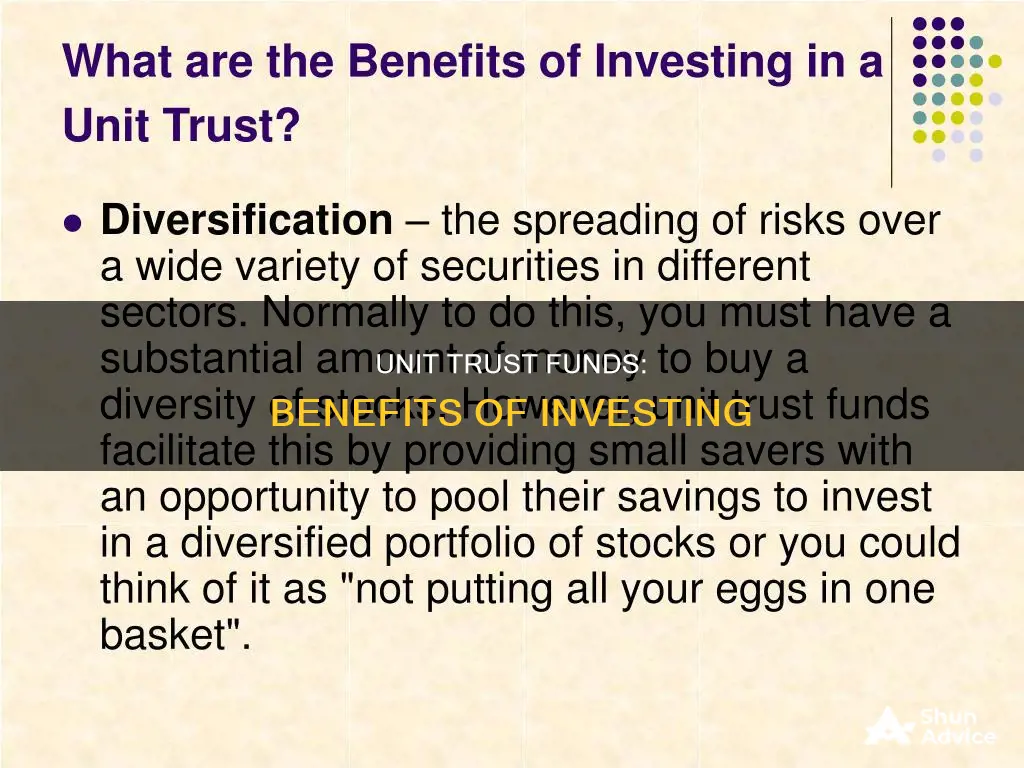
Unit trusts are a form of collective investment, allowing investors to pool their money together and invest in a range of securities, such as shares, bonds, cash, and property. The funds are managed by experienced professionals, and there are many benefits to investing in unit trusts. These include diversification of investments, reducing risk, access to professionals, exposure to different assets and markets, flexibility, affordability, and liquidity. Unit trusts are also well-regulated and legally protected, providing investors with peace of mind.
| Characteristics | Values |
|---|---|
| Risk | Reduced by diversification |
| Investment Amount | No obligation or fixed investment term required; can invest small amounts |
| Management | Managed by a financial professional |
| Trust Deed | Established under a trust deed |
| Beneficiary | The investor is the beneficiary |
| Investment | Provides access to different assets and markets |
| Liquidity | Highly liquid |
| Tax | Taxed at a lower rate than other forms of income |
| Legal Protection | Legally protected |
What You'll Learn

Access to professionals
One of the key benefits of investing in unit trust funds is gaining access to professionals, specifically experienced and knowledgeable fund managers. These professionals are responsible for managing your money and making investment decisions on your behalf. They possess the expertise and skills necessary to navigate the complexities of the stock market and other investment avenues.
Unit trust funds are typically overseen by fund managers, who are responsible for investing the pooled money of multiple investors. These fund managers are bound by the investment goals and objectives of the fund and are held accountable by trustees, who act as fiduciaries to protect the interests of the beneficiaries (the investors). The expertise of these fund managers lies in their ability to construct and manage a diverse portfolio of assets, which may include stocks, bonds, property funds, and other securities.
The advantage of having access to these professionals is that they bring a wealth of knowledge and experience to the table. While individual investors may not have the time or expertise to closely monitor the stock market and make informed investment decisions, fund managers are dedicated to this task. They are well-versed in financial trends, strategies, and risk management techniques, allowing them to make more informed and strategic choices. This expertise can be particularly valuable during volatile market conditions, as fund managers can employ strategies to mitigate risks and maximise returns.
Additionally, unit trust funds often provide investors with access to a team of highly qualified investment analysts who support the fund manager. This team approach ensures that your investments are carefully monitored and evaluated by a group of specialists, each contributing their own unique perspective and expertise. This collaborative approach can enhance the decision-making process and provide a layer of checks and balances within the fund management structure.
Furthermore, unit trust funds offer investors the benefit of professional fund management without the full costs typically associated with such services. The fees and expenses incurred in the management of the fund are shared among all investors, making it a more affordable option for individuals. This shared cost structure allows investors to access the expertise and resources of experienced professionals, potentially resulting in better-informed investment decisions and improved returns.
Bond Funds: Best Time to Invest and Why
You may want to see also

Diversification and reduction of risk
Investing in unit trust funds is an excellent way to diversify your portfolio and reduce risk. By pooling your money with other investors, you can access a wide range of securities, such as shares, bonds, cash, and property, that might otherwise be out of reach.
Unit trusts are a form of collective investment, and your money is always spread across different investment instruments, reducing your risk exposure. For example, an equity fund can diversify by purchasing shares in multiple companies, so the performance of one company won't significantly impact your investment.
Unit trusts are also an excellent way to access different markets and asset classes. They are often managed by experienced and professional fund managers, who have the expertise to make informed investment decisions and actively manage your fund.
The diversification offered by unit trusts means you are not putting all your eggs in one basket, so to speak. This reduces the risk of losing all your money if a particular company or market performs poorly. Instead, your investment is protected by the performance of other companies or markets in the fund.
Furthermore, unit trusts are typically open-ended, meaning they grow and shrink as investors buy and sell units. This provides investors with flexibility, as they can usually sell their units if they need to invest their money elsewhere. The price of each unit is based on the fund's net asset value (NAV) and is typically calculated daily.
Unit trusts are an excellent option for investors seeking to diversify their portfolios and reduce their risk exposure. With the guidance of professional fund managers, investors can access a wide range of securities and markets while minimising potential losses.
Tata Ethical Fund: Investing in a Brighter Future
You may want to see also

Exposure to different assets and markets
Investing in unit trust funds offers exposure to a wide range of different assets and markets, which can be highly beneficial for investors.
Pooling investors' funds together allows investors to access different investment securities, some of which may not be accessible if investing as an individual. This collective investment model enables investors to diversify their portfolios, reducing risk by spreading their money across various instruments and entities. For example, an equity fund can diversify by purchasing shares in multiple companies, rather than just one.
Unit trust funds also provide exposure to different markets, which can be particularly advantageous for investors looking to access international securities. This allows investors to broaden their investment horizons and potentially mitigate the impact of market-specific downturns.
The fund manager's role is crucial in this regard, as they are responsible for investing the pooled funds in line with the fund's objectives. They have the expertise and knowledge to navigate different assets and markets, making informed decisions on behalf of the investors.
By investing in unit trust funds, individuals can gain access to a diverse range of investment opportunities that may have otherwise been out of reach, thus increasing their potential for financial growth and reducing overall risk.
Mutual Fund Tax: What's the Reality?
You may want to see also

Well-regulated and transparent
Unit trust funds are well-regulated and transparent investment vehicles that offer investors a range of benefits.
Unit trust funds are a type of collective investment scheme, which means they are subject to specific legislation and regulatory oversight. This regulatory framework ensures that investors' interests are protected and that the funds are managed in a safe and prudent manner. The regulations also mandate certain disclosures, such as information on the risks of investing and fund holdings, ensuring transparency and allowing investors to make informed decisions.
The regulatory requirements for unit trust funds vary by region and country. For example, in some countries, unit trust funds are established under trust law, with a trustee or depositary responsible for safeguarding assets and ensuring the fund manager acts in the best interests of the beneficiaries. This legal structure provides an additional layer of protection for investors.
The transparency and regulatory framework of unit trust funds offer several advantages to investors. Firstly, it enables investors to make informed decisions by providing a clear understanding of the risks and holdings of the fund. Secondly, it helps to safeguard investors' capital by ensuring compliance with regulations and reducing the risk of fraud or mismanagement. Additionally, the regulatory framework provides legal safeguards, protecting investors against issues such as insufficient diversification or business risks within the management company.
The well-regulated and transparent nature of unit trust funds is a key advantage that helps to protect investors and promote informed decision-making. This regulatory oversight and transparency also contribute to the overall safety and stability of the investment, enhancing its appeal to risk-averse individuals.
Cash Reserves Fund: A Safe and Smart Investment Choice
You may want to see also

Flexibility and affordability
Unit trusts are a flexible investment option. They allow investors to choose how they invest, how long they invest for, and their contribution frequency. Investors can also decide how long they want their money invested, and for what purposes. For example, investors can choose to invest in a unit trust fund for an emergency fund, holiday fund, school fees, asset acquisition, or general saving.
Unit trusts also offer flexibility in terms of the types of funds available. Investors can choose funds that invest in particular sectors, assets, or regions, or those that take a more diversified approach. Some funds invest in other collective investments, known as multi-manager or fund of funds, while others make specific ethical investments.
Unit trusts are typically more affordable than investing in shares or bonds as an individual. They have low minimum investment requirements, allowing investors to start with small amounts and make regular contributions. At Bifm, for instance, investors can begin investing from as little as P200 per month. This makes unit trusts accessible to those who may not have accumulated large amounts of money to invest.
Unit trusts are also flexible in terms of liquidity. Investors can usually sell their shares at any time or during specific times of the year, providing access to their money within a short period. For example, Bifm Unit Trusts allow investors to access their money within 72 hours.
Unit trusts are a great option for those seeking flexibility and affordability in their investments. They allow investors to tailor their contributions to their needs and financial capabilities while providing access to a diverse range of investment options.
Mutual Funds vs Real Estate: Where Should You Invest?
You may want to see also







